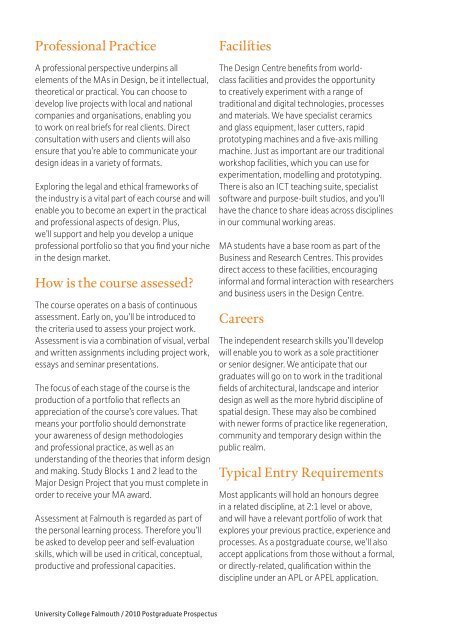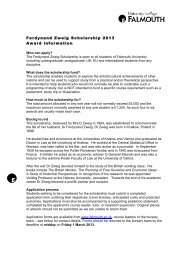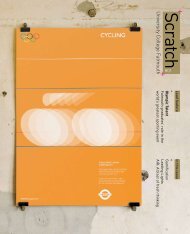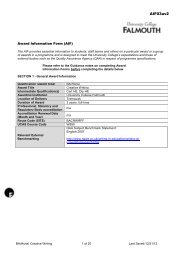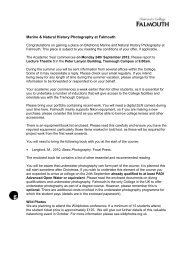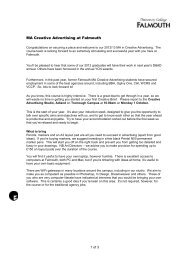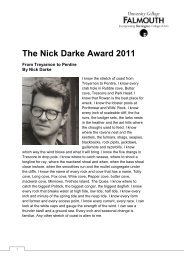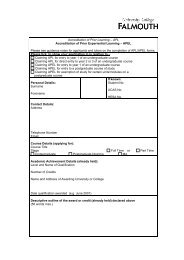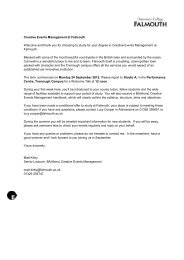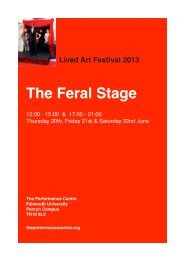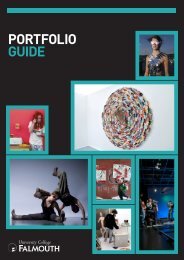2010 Postgraduate Prospectus - University College Falmouth
2010 Postgraduate Prospectus - University College Falmouth
2010 Postgraduate Prospectus - University College Falmouth
Create successful ePaper yourself
Turn your PDF publications into a flip-book with our unique Google optimized e-Paper software.
Professional Pra�ice<br />
A professional perspective underpins all<br />
elements of the MAs in Design, be it intellectual,<br />
theoretical or practical. You can choose to<br />
develop live projects with local and national<br />
companies and organisations, enabling you<br />
to work on real briefs for real clients. Direct<br />
consultation with users and clients will also<br />
ensure that you’re able to communicate your<br />
design ideas in a variety of formats.<br />
Exploring the legal and ethical frameworks of<br />
the industry is a vital part of each course and will<br />
enable you to become an expert in the practical<br />
and professional aspects of design. Plus,<br />
we’ll support and help you develop a unique<br />
professional portfolio so that you find your niche<br />
in the design market.<br />
How is the course assessed?<br />
The course operates on a basis of continuous<br />
assessment. Early on, you’ll be introduced to<br />
the criteria used to assess your project work.<br />
Assessment is via a combination of visual, verbal<br />
and written assignments including project work,<br />
essays and seminar presentations.<br />
The focus of each stage of the course is the<br />
production of a portfolio that reflects an<br />
appreciation of the course’s core values. That<br />
means your portfolio should demonstrate<br />
your awareness of design methodologies<br />
and professional practice, as well as an<br />
understanding of the theories that inform design<br />
and making. Study Blocks 1 and 2 lead to the<br />
Major Design Project that you must complete in<br />
order to receive your MA award.<br />
Assessment at <strong>Falmouth</strong> is regarded as part of<br />
the personal learning process. Therefore you’ll<br />
be asked to develop peer and self-evaluation<br />
skills, which will be used in critical, conceptual,<br />
productive and professional capacities.<br />
<strong>University</strong> <strong>College</strong> <strong>Falmouth</strong> / <strong>2010</strong> <strong>Postgraduate</strong> <strong>Prospectus</strong><br />
Facil�ies<br />
The Design Centre benefits from worldclass<br />
facilities and provides the opportunity<br />
to creatively experiment with a range of<br />
traditional and digital technologies, processes<br />
and materials. We have specialist ceramics<br />
and glass equipment, laser cutters, rapid<br />
prototyping machines and a five-axis milling<br />
machine. Just as important are our traditional<br />
workshop facilities, which you can use for<br />
experimentation, modelling and prototyping.<br />
There is also an ICT teaching suite, specialist<br />
software and purpose-built studios, and you’ll<br />
have the chance to share ideas across disciplines<br />
in our communal working areas.<br />
MA students have a base room as part of the<br />
Business and Research Centres. This provides<br />
direct access to these facilities, encouraging<br />
informal and formal interaction with researchers<br />
and business users in the Design Centre.<br />
Car�rs<br />
The independent research skills you’ll develop<br />
will enable you to work as a sole practitioner<br />
or senior designer. We anticipate that our<br />
graduates will go on to work in the traditional<br />
fields of architectural, landscape and interior<br />
design as well as the more hybrid discipline of<br />
spatial design. These may also be combined<br />
with newer forms of practice like regeneration,<br />
community and temporary design within the<br />
public realm.<br />
Typical Entry Requirements<br />
Most applicants will hold an honours degree<br />
in a related discipline, at 2:1 level or above,<br />
and will have a relevant portfolio of work that<br />
explores your previous practice, experience and<br />
processes. As a postgraduate course, we’ll also<br />
accept applications from those without a formal,<br />
or directly-related, qualification within the<br />
discipline under an APL or APEL application.


